"Socialism in the 21st century: China—Belarus" International Academic Conference
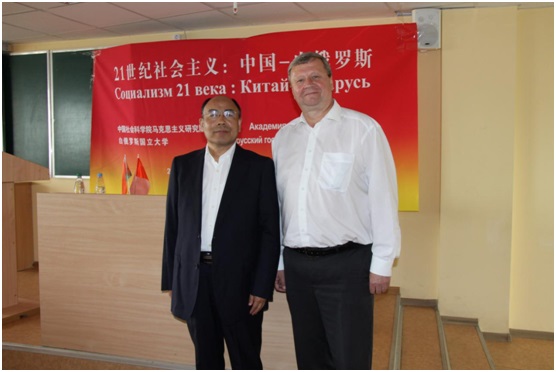
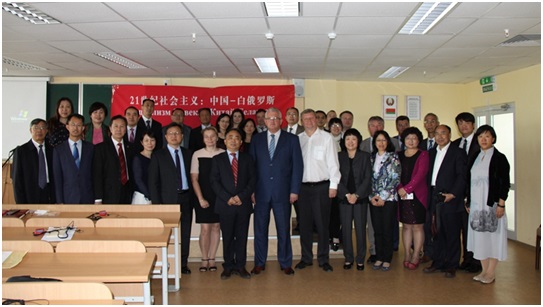
On June 14-15, 2016, the Institute of Marxism of the Chinese Academy of Social Sciences, together with the Belarusian National University and the Belarusian Communist Party jointly held the international academic conference "socialism in the 21st century: China—Belarus " in Minsk, Belarus. The meeting was co chaired by Deng Chundong, Secretary of the Party committee and President of the Marxism Research Institute of the Chinese Academy of Social Sciences, and Professor Victor sadulski, director of the Department of international relations of Belarusian National University. Nearly 60 Chinese and Belarus (Russian) scholars from more than 20 universities and institutions including the Chinese Academy of Social Sciences, the people's University of China, Dalian University of technology, Northeast Normal University, Shanghai University of foreign trade and economic cooperation, Zhengzhou University, Guangxi Publishing Group, Belarusian National University, Belarusian communist party attended the meeting.
China's "The Belt and Road" strategy and the prospect of cooperation between China and Belarus were discussed in a lively and in-depth way around the twenty-first Century socialist development road. Chinese and Belarus scholars believe that exploring alternatives to capitalism is still the theme of the 21st century. In practice, countries need to explore their own development path according to national conditions. The success of China's road fully shows the vitality of socialism and has a profound impact on the fate and development prospects of socialism in the 21st century. The scholars also agreed that the construction of the Silk Road Economic Belt will help China and Belarus get rid of the unequal international trade rules dominated by developed countries, promote the fairness and rationalization of world economic and trade rules, and open up new cooperation space for China and Belarus. Scholars of the two countries should further strengthen academic exchanges and jointly contribute to the enhancement of cooperation between China and Belarus.
During the meeting, Secretary Deng Chundong, head of the delegation, and some Chinese representatives attended the meeting, held talks with Mr. Igor kolpoco, first Secretary of the Central Committee of the Communist Party of Belarus and Deputy Secretary of Minsk municipal Party committee, and discussed how to strengthen communication and exchanges between the two sides.
"China and Russia: building a fair and secure world order" international academic conference held in St. Petersburg, Russia
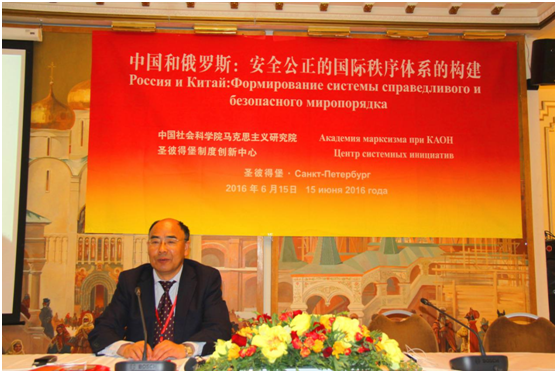
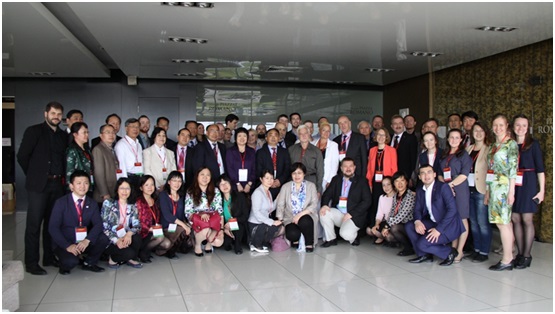
On June 15, 2016, the third Sino Russian International Academic Conference "China and Russia: building a fair and secure world order" was held in St. Petersburg, Russia. More than 100 experts and scholars from home and abroad attended the symposium.
"China Russia cooperation is very important and can become an important level in the world pattern," said Borika Borapov Sergei Vladimir VICH, President of the Russian ideological innovation center in his opening speech. The theme of today's meeting is "China and Russia: building a fair and secure world order", which is to focus on cooperation and discussion of relevant issues in this regard. Network security is also one of today's themes. Network security is an important aspect of information security. China and Russia should carry out extensive cooperation in all fields and in all aspects. "
Deng Chundong, Secretary of the Party committee and President of the Marxism Research Institute of the Chinese Academy of Social Sciences, said in his opening speech: "why we go to the same place three times in a row is enough to show the consistency of our understanding of important issues and our common feelings." "The Russian side gave us very good suggestions after two previous discussions in St. Petersburg. It is of great benefit to us in building socialism with Chinese characteristics. " "We should study and summarize the experience and lessons of the history of the international communist movement. The collapse of the socialist system of the former Soviet Union has a great influence on geopolitics, which needs to be seriously summarized and studied. We believe that the strategy of peaceful evolution of the socialist countries led by the United States in the West made the Communist Party of the Soviet Union gradually relax its governance and played an important role in the evolution of the Soviet Union. We should learn from the past. Although today is a multipolar world, on major issues related to regional and global affairs, the United States and Japan have joined hands to encircle China and Russia with unbridled means and well-known purposes. Chinese and Russian scholars should see this clearly, and we should provide suggestions for national security and jointly promote our security interests. "
Li abeva, editor in chief of national socialism International Publishing House A kind of Elena A kind of "The cooperation and forum between China and Russia should not only affect our two countries, but also promote the fairness and justice of the world," Professor rivavna said in his opening speech
After that, more than 20 Chinese and foreign experts and scholars delivered speeches. Lyudmila, Professor of Moscow University of finance, politics and law and chief scientific officer of the Research Center for social and cultural change, Institute of philosophy, Russian Academy of Sciences A kind of Alexeevna A kind of "What is a reasonable order in the world?" bravka buzgalina said in her speech? This is to achieve equality, social and cultural equality. Every country has its own characteristics, and it is equal to keep them. In addition to their own claims, to take care of the requirements of other countries in the world. " In addition, she stressed in particular the important role of humanitarianism in the fairness and security of mankind.
Deng Chundong, Secretary of the Party committee and President of the Institute of Marxism, Chinese Academy of Social Sciences, and Hong Xiaonan, Dean of the school of Marxism, Dalian University of technology, summarized the meeting on behalf of China.
The third "China Russia forum": a seminar on "regional integration program between China and Russia: issues and prospects of cooperation" was held in Moscow
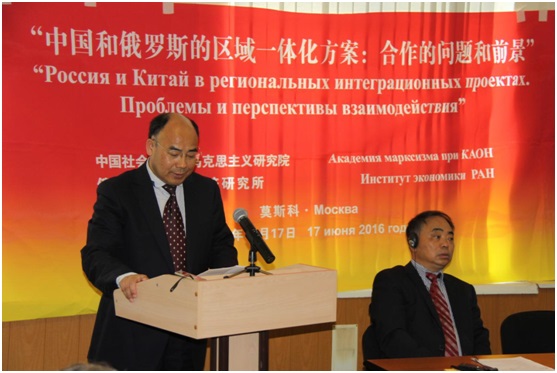
On June 17, 2016, the Institute of Marxism of the Chinese Academy of Social Sciences and the Institute of economics of the Russian Academy of Sciences in Moscow, Russia jointly hosted the international academic conference "regional integration program between China and Russia: issues and prospects of cooperation". More than 30 scholars from Chinese Academy of Social Sciences, Renmin University of China, Dalian University of technology, Xiamen University, Anhui University, Zhengzhou University, Northeast Normal University, Guangxi Normal University, Henan University of science and technology, Jiangsu Yancheng Normal University and other domestic universities and research institutions, and nearly 20 scholars from Orosco University and other research institutions attended the seminar.
Deng Chundong, Secretary of the Party committee and President of the Institute of Marxism of the Chinese Academy of Social Sciences, delivered a speech on behalf of China. He first introduced the background of this forum. He said that this year, the two sides have held the "China Russia forum" for the third time. The first three forums have achieved good results, strengthened mutual understanding, enhanced mutual friendship and successfully promoted cooperation between the two sides. He hoped that this forum will further push forward cooperation between the two sides. Yelena lenichuk, newly elected director of the Economic Research Institute of the Russian Academy of Sciences, delivered a speech on behalf of Russia. She spoke highly of China's development achievements and believed that China's development has made an important contribution to world peace and development. Under the current international situation (conditions), China and Russia need to work together to learn from each other and learn from each other. In particular, she hoped that China would introduce more successful experiences and make contributions to promoting friendly cooperation between Russia and China.
Since then, representatives of the two sides made statements at the conference. Six Chinese scholars spoke one after another. President Hong Xiaonan made a speech entitled "my view on China's road".
Five Russian scholars made statements. Among them, Kant lasova, a senior researcher of Russian Academy of Sciences, introduced two books on China's development path that I had completed. She highly praised China's development path and believed that Russia's reform model could learn from China. Kantrasova's view has been approved by most Russian scholars. Russian representatives also made speeches on natural gas pipeline cooperation between Russia and China, Russian Far East Development and other topics. Both China and Russia agree that despite the short time of this forum, Chinese and Russian scholars have conducted very effective and full exchanges and further increased mutual understanding. Both sides hope to continue to strengthen exchanges in economic, political, diplomatic and cultural aspects in the future, so as to provide better decision-making suggestions for cooperation between the two countries.
"Socialism in the 21st century: China Bulgaria Symposium" held in Bulgaria
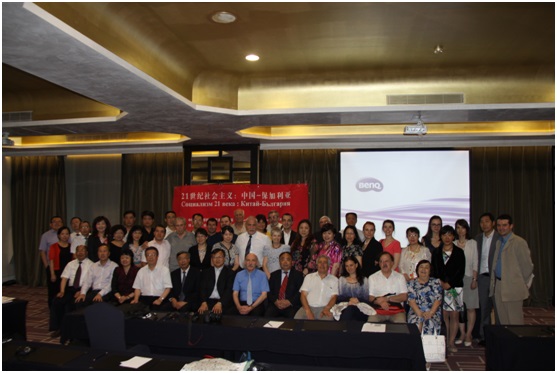

On June 20, the " 21st century socialism: China Bulgaria academic seminar" jointly organized by the Marxism Research Institute of the Chinese Academy of Social Sciences and the research center of history and political science of the National Political Research Institute of " kimitel bragoev" of the Bulgarian Socialist Party National Committee was held in Sofia, Bulgaria. Deng Chundong, head of the Chinese delegation, President and Secretary of the Party committee of the Marxism Research Institute of the Chinese Academy of Social Sciences, delivered a speech on behalf of China at the opening ceremony and made a concluding speech. On behalf of the Bulgarian socialist party, Dr. Valery gambleno, member of the Executive Board of the socialist party and chairman of the National Committee of the socialist party, delivered a speech at the opening ceremony. Marci mumizov, director of the research center of history and political science of the National Political Research Institute of "kimitel bragoev", National Committee of the Bulgarian socialist party, made a concluding speech on behalf of the Bulgarian socialist party. During the meeting, the chairman of Bulgarian Socialist Party led five Political Bureau committees to meet with President Deng Chundong.
Scholars from China and the United States have discussed in depth the basic characteristics of socialism, the experiences and lessons of socialism in the twentieth Century, the reasons and effects of Bulgarian social changes, the experience of socialism with Chinese characteristics, Xi Jinping's governing ideology, the transformation of socialist countries, the opportunities, challenges, models and prospects of twenty-first Century. A lot of consensus has been reached. Baofang scholars highly affirmed the success of socialism with Chinese characteristics, and believed that the key to the success of socialism with Chinese characteristics lies in adhering to the basic principles of socialism and the leadership of the Communist Party of China. The profound reason for the great changes in Bulgaria more than 20 years ago is that the Communist Party of Bulgaria voluntarily gave up the socialist road under the influence of Neo liberalism. The great changes in Bulgaria led to the stagnation of the long-term socio-economic development in Bulgaria, which had a serious impact on the life of the Bulgarian people and left a painful lesson. The Chinese scholars agree that capitalism is an outdated system, socialism is a necessary choice for the world, and we should be confident in the future of socialism. Socialism in the 21st century should sum up the experience and lessons of socialism in the 20th century and adapt to the new situation in the 21st century, especially the needs of the fourth industrial revolution and information revolution. We should combine the basic principles of socialism with the specific realities of all countries, uphold the basic values of equality of socialism, effectively play the role of the state, give full play to the main role of the people of all countries, and strengthen the ties between the socialists of all countries and the progressive forces of the left.
Deng Chundong, speaking on behalf of Chinese scholars, pointed out that at this forum, Bulgarian scholars' full affirmation of socialism with Chinese characteristics greatly encouraged our confidence in adhering to socialism with Chinese characteristics, and their enthusiasm for Chinese scholars made Chinese scholars fully feel that the Bulgarian people continued their friendship with the Chinese people during the socialist period. President Deng Chundong hoped that the proposal of holding a similar forum every year received a positive response from the Bulgarian socialist party.
Deng Chundong, Secretary of the Party committee and President of the Institute of Marxism of the Chinese Academy of Social Sciences, Pan Jine, researcher, Hao Lixin, assistant to the president of Renmin University of China and President of the school of Marxism of Dalian University of technology, and Hong Xiaonan, President of the school of Marxism of Dalian University of technology, presided over the meeting on behalf of China.
Bulgarian scholars also attended the meeting: President of the National Political Research Institute of "kimitel blagoyev" of the National Committee of the Socialist Party of Bulgaria, President of the National Committee of the Socialist Party of Bulgaria, Evelyn nikov, deputy speaker of the national assembly of Bulgaria, and vice professor yanajistoilov, chairman of the China Friendship Group of the national assembly.
Bulgarian scholars also attended the meeting: President of the National Political Research Institute of "kimitel blagoyev" of the National Committee of the Socialist Party of Bulgaria, President of the National Committee of the Socialist Party of Bulgaria, Evelyn nikov, deputy speaker of the national assembly of Bulgaria, and vice professor yanaji stoilov, chairman of the China Friendship Group of the national assembly. Professor iskrabayeva of Sofia University, Professor nako stefanov, researcher of the research center of history and political science of the National Political Research Institute of "kimitel bragoev" of the National Committee of the Bulgarian socialist party, and Professor yev, associate professor of Sofia University, gave them to nicotirov. Professor Vasil prodalov of the University of national and world economics, doctor of the University of national and world economics, researcher of the research center of history and political science of the National Political Research Institute of "kimitel bragoev" of the National Committee of the Bulgarian socialist party, etc.
The Chinese scholars present at the meeting also included pan Jin'e, Gong Yun, Hou Weimin, Shang Wei, deputy researchers of Marxism Research Institute of Chinese Academy of Social Sciences, Wang Xiaoju, researcher of World History Research Institute of Chinese Academy of Social Sciences; Tan Yangfang, researcher of scientific research bureau;Zhang Jing, director of information and Information Research Institute, Li Ling, President of Hongqi manuscript magazine, Hao Lixin, Dean of School of Marxism, Renmin University of China, Bai Xineng, Feng Xia, Zhang Yantao, Dean of School of Marxism, Xiamen University, Hong Xiaonan, Dean of School of Marxism, Dalian University of technology;Professor Hu Haibo and Li Yan of Northeast Normal University, and Professor Zheng Yongkou, former Secretary of the Party committee of Zhengzhou University. Professor Yu Xiangdong, Dean of the school of Marxism, Professor Yu Li, School of public management, Professor Wu Xueqin, Dean of the school of Marxism, Anhui University, and Professor Zhong Ruitian, School of Marxism, Guangxi Normal University. Professor Zhang Guifang and Dr Zhou Jie, Dean of the school of Marxism of Shanghai University of foreign trade and economic cooperation, Professor Liu Zhenjiang, Dean of the school of Marxism of Henan University of science and technology, Professor Wang Ren, Secretary of the Party committee of the school of Marxism of Jiangxi Normal University, Professor Jia houming, Yancheng Normal University, director Zhao Yingchen, editorial department of socialism with Chinese characteristics, etc.
During the meeting, President Hong Xiaonan accompanied Deng Chundong, Secretary of the Party committee and President of the Marxism Research Institute of the Chinese Academy of Social Sciences, to attend three meetings.
On June 16, 2016, at the invitation of the municipal government of St. Petersburg, Russia, some members of the delegation went to the palace of smorni, where the municipal government of St. Petersburg is located, to meet with the relevant leaders of the external liaison committee of St. Petersburg. After the meeting, the relevant leaders of the Foreign Liaison Committee of St Petersburg invited Secretary Deng Chundong and his party to hold a visit to "walk into the palace of smorni and walk into Lenin". The smorni palace was where Lenin first worked and lived after the October Revolution. Here, the delegation visited the first manuscript of the first article of the Soviet constitution drafted by Lenin, the office where Lenin worked and the room where Lenin once rested. The simple life of the founder of the first socialist country in the history of human beings makes us sigh, approach the great man, and let us feel the great power of the great man.

On June 18, 2016, he met with Novikov, deputy secretary of the Central Committee of the Communist Party of the Russian Federation, at Heping Street, Moscow.
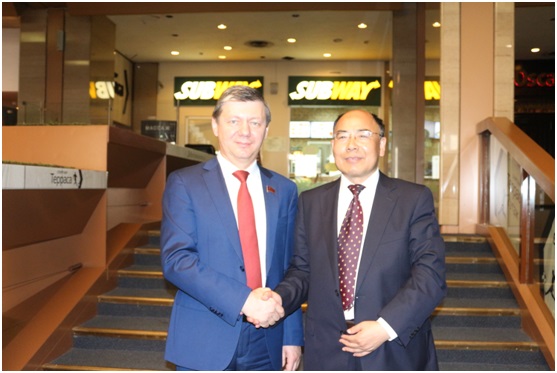
On June 20, 2016, I met with Dr. Valery ginbulanov, member of the Executive Board of the socialist party, chairman of the thought and Planning Development Committee of the National Committee of the socialist party and two other executive board committees in Sofia.
